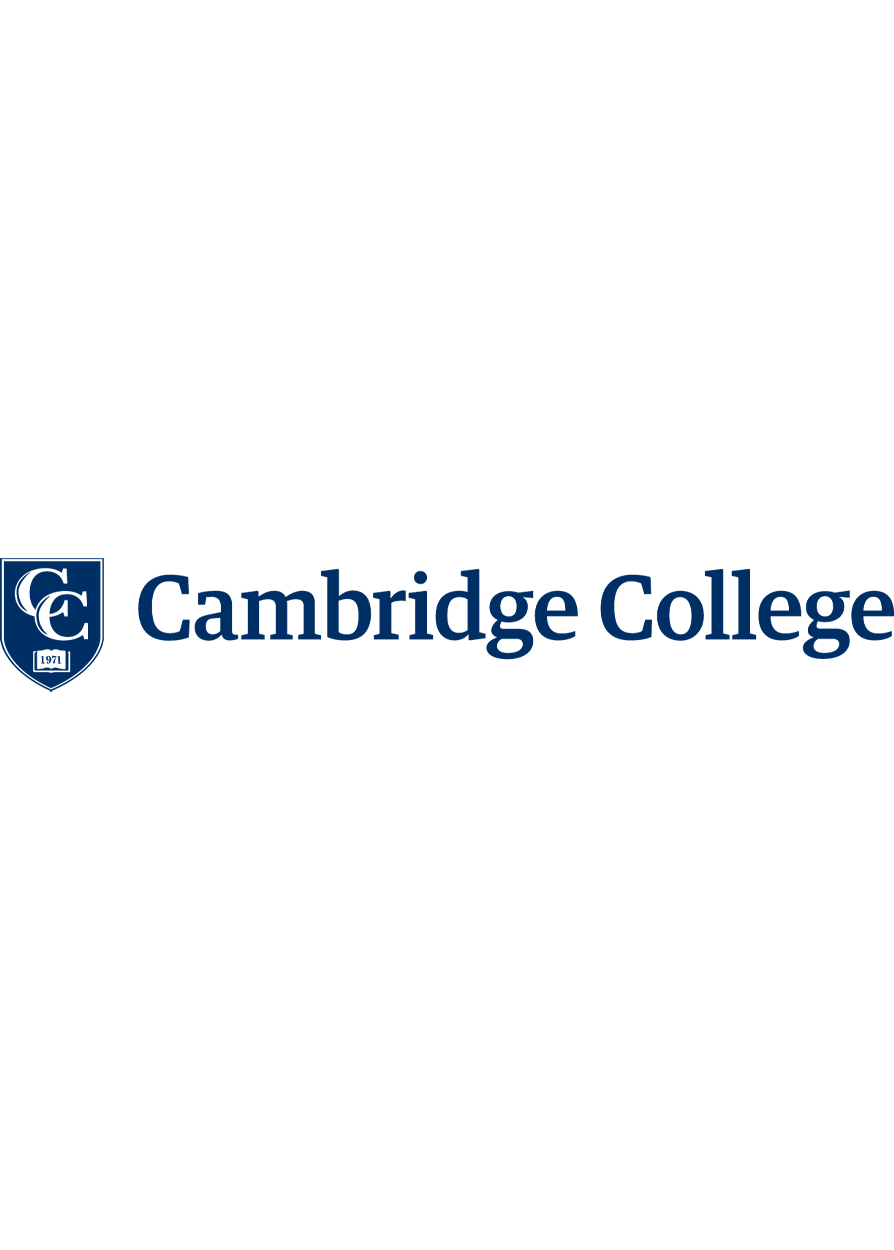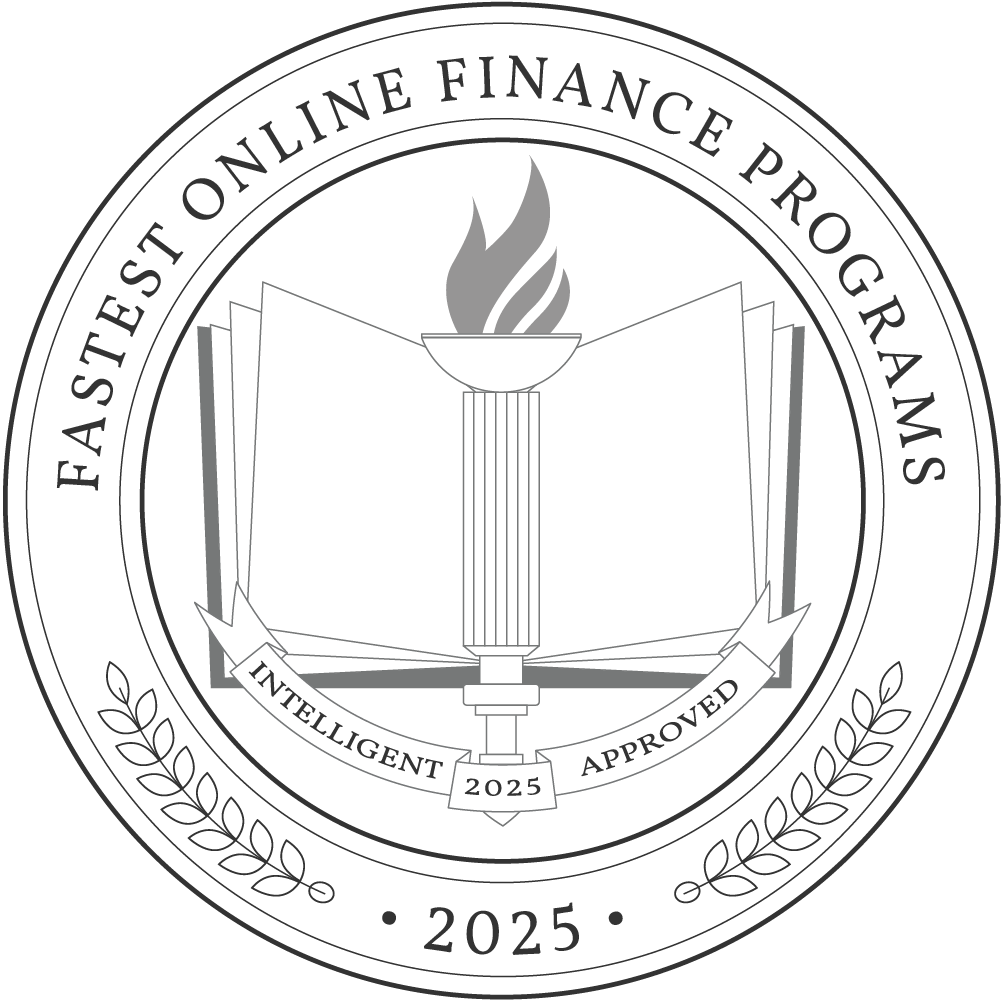The finance industry is booming, offering lucrative salaries for roles expected to be in high demand over the next decade. The fastest online finance degree programs provide a quick, accessible way to earn your degree, allowing you to kickstart your career on a shorter timeline. Graduates with a bachelor’s degree can pursue careers as financial analysts, with a median salary of $99,890. Those with a master’s degree can become financial managers, earning a median salary of $156,100.
These accelerated programs can be completed in as little as two to three years for a bachelor’s and 12 to 18 months for a master’s, making your path to success more efficient.
Why Trust Us
The Intelligent.com Higher Education Team is dedicated to providing students with independent, equitable school and program rankings and well-researched resources. Our expert-driven articles cover topics related to online colleges and programs, paying for school, and career outlooks. We use data from the U.S. Department of Education’s College Scorecard, the National Center for Education Statistics, and other reputable educational and professional organizations. Our academic advisory team reviews content and verifies accuracy throughout the year for the most current information. Partnerships do not influence rankings or editorial decisions.
- Analyzed over 2,000 national, accredited, and nonprofit colleges and universities
- 800+ rankings pages are reviewed and updated yearly
- Content is informed by reputable sources, surveys, and interviews with academic advisors and other experts
- Over 100 data points are reviewed for accuracy and quality throughout the year, including sources
How we rank schools
Our list features the fastest online Finance degree programs at top colleges nationwide. Each school featured is a nonprofit, accredited institution — either public or private — with a high standard of academic quality for post-secondary institutions.
We evaluated each school’s program on tuition costs, admission, retention and graduation rates, faculty, reputation, and the student resources provided for online students. We collected data from trusted sources like the National Center for Education Statistics, individual school and program websites, school admissions counselors, and other data sources. Then, we calculated the Intelligent Score on a scale of 0 to 100 based on the following criterion:
Academic Quality:
- Admission rate versus enrollment rate
- Retention rate of students who return after year one
- Accreditation status (regional and programmatic)
- Nonprofit status, both private and public institutions
Graduation Rate
- Overall graduation rate
- Total number of currently enrolled students, including diversity metrics
- Student-to-faculty ratio
Cost and ROI
- In-state and out-of-state per-credit tuition rates and fees
- Required credits to graduate
- Earning potential after graduation
- Availability of federal student loans, scholarships, and other financial aid options
Student Resources
- Available student services for online-only and hybrid programs
- On-campus amenities like tutoring centers and the number of libraries
Read more about our ranking methodology.
Best 10 Accredited Fast Online Finance Programs
FiltersInstitution Type
Status
- Intelligent Score
- Alphabetically By University Name
- Acceptance Rate
- Enrollment
- In-state Graduate Tuition
- Out-of-state Graduate Tuition
- In-state Undergraduate Tuition
- Out-of-state Undergraduate Tuition

Auburn University
Intelligent Score: 99.91In-state: $10,080
Out-of-state: $30,240
In-state: $10,080
Out-of-state: $10,080
SAT: 1160-1320
ACT: 25-31
$558
Online, On-Campus
Association to Advance Collegiate Schools of Business
123

Lamar University
Intelligent Score: 99.8In-state: $6,129
Out-of-state: $15,945
In-state: $6,397
Out-of-state: $6,397
SAT: 943-1140
ACT: 17-23
$314
Online
Association to Advance Collegiate Schools of Business
120

University of Maryland Global Campus
Intelligent Score: 98.68In-state: $8,824
Out-of-state: $34,936
In-state: $13,158
Out-of-state: $13,158
SAT: 1270-1480
ACT: 30-34
In-State: $324
Out-of-State: $499
Online, Hybrid
Middle States Commission on Higher Education
120

Bemidji State University
Intelligent Score: 98.58In-state: $7,976
Out-of-state: $7,976
In-state: $8,012
Out-of-state: $8,012
SAT: N/A
ACT: 19-24
$314
Online
International Accreditation Council for Business Education
64

DeSales University
Intelligent Score: 98.24In-state: $38,500
Out-of-state: $38,500
In-state: $20,520
Out-of-state: $20,520
SAT: 1010-1240
ACT: 22-28
$575
Online, On-Campus
Accreditation Council for Business Schools and Programs
120

Eastern Kentucky University
Intelligent Score: 98.11In-state: $9,266
Out-of-state: $19,338
In-state: $9,900
Out-of-state: $9,900
SAT: 950-1170
ACT: 19-25
$434
Online
Association to Advance Collegiate Schools of Business
120

University of Houston - Clear Lake
Intelligent Score: 97.38In-state: $23,230
Out-of-state: $36,526
In-state: $29,984
Out-of-state: $29,984
SAT: 990-1173
ACT: 18-23
Resident: $246
Non-Resident: $812
Online
Association to Advance Collegiate Schools of Business
120.0

Bellevue University
Intelligent Score: 94.84In-state: $7,176
Out-of-state: $7,176
In-state: $10,710
Out-of-state: $10,710
SAT: N/A
ACT: N/A
$449
Online
International Accreditation Council for Business Education
127

Cambridge College
Intelligent Score: 94.38In-state: $32,388
Out-of-state: $32,388
In-state: NA
Out-of-state: NA
SAT: Not Required
ACT: Not Required
$502
Online
New England Commission of Higher Education
120

Albertus Magnus College
Intelligent Score: 90.52In-state: $34,410
Out-of-state: $34,410
In-state: $21,120
Out-of-state: $21,120
SAT: N/A
ACT: N/A
$563
Online, On-Campus
International Accreditation Council for Business Education
54
How to Choose a Fast Online Finance Program
Choose your area of study
Selecting an area of study for your finance degree can help align your education with your career goals while making you a more competitive hire. At the undergraduate level, options like corporate finance, investment banking, or financial planning may be ideal for students interested in specific industry sectors. Graduate students can often opt for more advanced specializations, like financial engineering, risk management, or international finance, suited for those seeking high-level positions.
Research schools and programs
Now that you have a specialization in mind, you can begin researching schools and programs in earnest. You may come into this process with some questions of your own, but here are a few more to help guide your research:
- Does the curriculum align with my career goals?
- Are the faculty experienced and respected in the industry?
- What support services are available for online learners?
- What are the program’s graduation and job placement rates?
Most of this information is readily available on school websites, from an admissions counselor, or at an information session.
Prepare for tests and applications
While some programs may have different application requirements, many share the same criteria. This typically includes:
- Transcripts from previously attended institutions
- Letters of recommendation
- Personal statement or essay
- Resume with relevant experience
- Standardized test scores
To help with test prep, utilize resources like ACT and SAT prep courses if you’re a prospective undergraduate or GRE prep programs if you’re seeking a graduate degree.
Select your program
The arrival of acceptance letters is always an exciting time, but it can quickly become overwhelming if you receive more than one. Revisit your initial research criteria and focus on what matters most to you – whether that’s curriculum relevance, the faculty you’ll learn from, or support services for online learners. Then, reassess the total cost of attendance and compare it to any financial aid offers.
Determine how you’ll pay for your degree
To best finance your degree, prioritize scholarships and grants, which are essentially free money and don’t need to be repaid. Next, consider work-study or assistantships, allowing you to earn money while gaining resume-boosting work experience. Employer tuition reimbursement programs are another excellent option if your employer offers assistance.
When loans are necessary, federal loans usually offer more favorable terms than private loans, so apply for these first through the FAFSA. Private loans should be a last resort to bridge any remaining financial gap.
What Can You Expect From a Fast Online Finance Program?
An online accelerated finance degree program provides an all-encompassing education in financial principles, investment strategies, and economic theory. Students will gain foundational knowledge in accounting, financial markets, corporate finance, and risk management at the bachelor’s level. Coursework at the master’s level delves into topics like financial analysis, portfolio management, and international finance.
Programs are designed to be flexible, with most coursework completed online, allowing students to balance their studies with other commitments — like a full-time job or raising a family. Many programs offer both thesis and non-thesis tracks to accommodate different career goals. Bachelor’s degrees can typically be completed in two to three years, while master’s programs may take 12 to 18 months, depending on your pace.
Students interested in analyzing financial information should also consider earning a bachelor’s or master’s degree in accounting, as this may be a better fit for your personal interests and career goals.
Potential courses you’ll take in a fast online finance program
- Financial Accounting: In this course, students learn accounting principles, including preparing and analyzing financial statements. They’ll gain skills in recording financial transactions, understanding the balance sheet, income statement, and cash flow statement, and ensuring compliance with accounting standards. Many curriculums consider this course essential, as it’s critical for making informed financial decisions in any business setting.
- Corporate Finance: This course covers the financial activities of running a corporation, focusing on investment decisions, capital structure, and financing. Students will learn to evaluate investment opportunities, manage company assets, and optimize financial performance. Topics such as dividend policy, mergers and acquisitions, and risk management are also explored to prepare students for strategic financial roles.
- Investment Analysis and Portfolio Management: Here, students will delve into the theories and practices of investing, learning how to analyze different investment vehicles like stocks, bonds, and derivatives. The course teaches portfolio construction, diversification strategies, and performance evaluation. Practical skills in assessing market conditions and making investment decisions help prepare students for investment banking, asset management, and financial planning careers.
What Can I Do With a Finance Degree?
A finance degree will prepare you for various roles within the field, with lucrative, in-demand opportunities for bachelor’s and master’s graduates alike.
Career outlook
- Financial Analyst — These professionals assess the performance of stocks, bonds, and other investments while providing guidance to businesses and people making investment decisions. This role is typically available to graduates with a bachelor’s degree.
- Median annual salary: $99,890
- Projected employment growth (through 2032): 8%
- New jobs projected: 27,400
- Accountant — Accountants prepare and examine financial records, ensuring accuracy and compliance with laws and regulations. Most of these positions require a bachelor’s degree.
- Median annual salary: $79,880
- Projected employment growth (through 2032): 4%
- New jobs projected: 126,500
- Financial Manager — Ideal for master’s graduates, financial managers oversee an organization’s economic health and develop strategies and plans for long-term financial goals.
- Median annual salary: $156,100
- Projected employment growth (through 2032): 16%
- New jobs projected: 69,600
Fast Online Finance Degree Frequently Asked Questions
How do accelerated degree programs work?
These programs condense traditional coursework into a shorter time frame, allowing students to complete their education faster. It’s important to note that accelerated programs maintain the same curriculum and quality of education as standard programs but offer courses in a more intensive format, often with shorter terms and more frequent classes. To learn more about the benefits and potential challenges and to determine if this is the right path for you, explore our page that details the pros and cons.
How long does it take to earn a fast online finance degree?
A fast online finance degree can often be completed in two to three years for an undergraduate program, compared to the four years needed for traditional programs. Graduate programs may take 12 to 18 months versus the usual two to three years for conventional tracks.
The timeline depends on total credit requirements, which can vary significantly, especially for master’s programs. Evaluating these requirements is crucial to better understand the exact duration of your studies.
How much does a fast online finance degree cost?
The average annual cost of tuition is $14,688 for undergraduate degrees and $20,513 for graduate degrees. While accelerated programs sometimes offer lower tuition than traditional ones, this isn’t always true. You’ll also want to budget for additional expenses, like technology fees, textbooks, and course materials — which can add up over time and significantly affect the total cost of attendance.
Consult a financial aid counselor at your intended program to get a clearer picture of the total cost.


